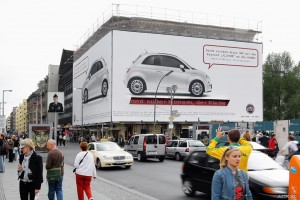
While the core Fiat brand strategy is ecologically sound, the sales decline calls into question the demand and profitability of green automobiles
While the Auto Task Force of President Obama has endorsed a takeover of Chrysler LLC by Italian carmaker Fiat, the group’s own first quarter results call into question the health of one of Europe’s leading small car makers.
Fiat SpA in Turin this morning reported a Q1 loss of €410 million ($536 million) even as it was claiming that it can still be profitable for the year, estimating a €1 billion return. The loss, which compared with a profit of €405 million a year earlier, comes as the restructuring negotiations between Chrysler and its secured debtors and unions face an April 30th deadline, with no resolution in sight. Fiat also has almost $9 billion in debt, excluding financial services.
Yesterday, the U.S. Treasury Department immediately and publicly turned down the latest offer by banks and bondholders to convert only a small portion of Chrysler’s debt in return for a 40% stake in the company. Chrysler said, “We continue to work around the clock” to obtain an agreement that meets the requirements of the U.S. and Canadian governments for continued taxpayer financing instead of liquidation.
Fiat’s loss, the first since 2004, was caused by declining sales of its cars and trucks of -25%. Fiat Automobiles is one of Europe’s ten best-selling automotive brands, and in 2007 and 2008 it had the lowest average value for CO2 emissions from its vehicles. The company also produces Alfa-Romeo, Lancia, and Iveco trucks. Results for Maserati and Ferrari car brands are not included in the Group’s reporting.
While the core Fiat brand strategy is ecologically sound, the sales decline also calls into question the demand and profitability of green automobiles in times of economic crisis. Fiat is Europe’s leader in the production of compact vehicles, and Chrysler recently showed its 500 model at a press conference during the New York International Auto Show. The small 500 and the larger Bravo models introduced Euro 5 complaint petrol and diesel engines ahead of competitors. By the end of 2009, most engines in the FIAT range will will comply with Euro 5 standards. This places it ahead of competitors, according to Fiat.
The restructuring plans at both Chrysler and General Motors are heavily dependent on continued demand for such clean vehicles globally, and in the U.S. market where small cars have not been profitable or popular.
While Sergio Marchionne, Fiat’s CEO, insists that an alliance with another automaker is needed to keep the company viable, he is not willing, thus far, to put any money into the proposed Chrysler takeover. Some analysts are now questioning whether such a link threatens the viability of Fiat.
The company also refused to comment on reports that is about to take an interest in Opel, GM’s struggling European subsidiary.
Fiat’s stock price has almost doubled since the potential alliance with Chrysler was announced but it is off sharply from its 52 week high of $24. It is currently trading at under $10 a share.
